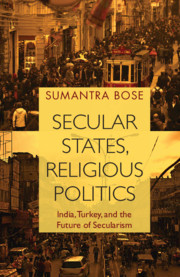Book contents
3 - Paradoxes of the Secular State
Published online by Cambridge University Press: 20 October 2018
Summary
Congress shall make no law respecting an establishment of religion, or prohibiting the free exercise thereof.
— The First Amendment to the Constitution of the United States of America, 1791The classic conception of the Western secular state is expressed in the first amendment to the United States’ Constitution, proposed by James Madison in 1791. The amendment strengthened the secular basis of the US Constitution ratified in 1789 – the same year as the French Revolution shook Europe with its rejection of monarchy, aristocracy and clericalism – which had made no reference to God and specified that ‘no religious test shall ever be required as a qualification to any office or public trust under the United States’. In 1802 President Thomas Jefferson famously wrote, in a letter to a local association of adherents of the Baptist denomination in a town in the State of Connecticut, ‘I contemplate with sovereign reverence that act of the American people which declared that their legislature should make no law respecting an establishment of religion or prohibiting the free exercise thereof—thus building a wall of separation between the church and the state’. Of course, that doctrine of separation has not been absolute in practice; Donald Smith listed such practices as ‘the appointment of Protestant, Catholic and Jewish chaplains in the armed services, the tax exemption granted to churches and synagogues, [and] the opening of State and national legislative sessions with prayer’. We might add to that list the habit of US Presidents to end important speeches to the nation with ‘God bless the United States of America’. But, as he argued, ‘the basic [twin] principles of religious freedom and church–state separation have been adhered to throughout … American history’. In a landmark ruling in 1948, the US Supreme Court declared religious instruction in the public school system of the State of Illinois as unconstitutional in unequivocal terms, ‘Separation is a requirement to abstain from fusing the functions of government and religious sects, not merely to treat them all equally … Separation means separation, not something less’.
- Type
- Chapter
- Information
- Secular States, Religious PoliticsIndia, Turkey, and the Future of Secularism, pp. 79 - 116Publisher: Cambridge University PressPrint publication year: 2018



